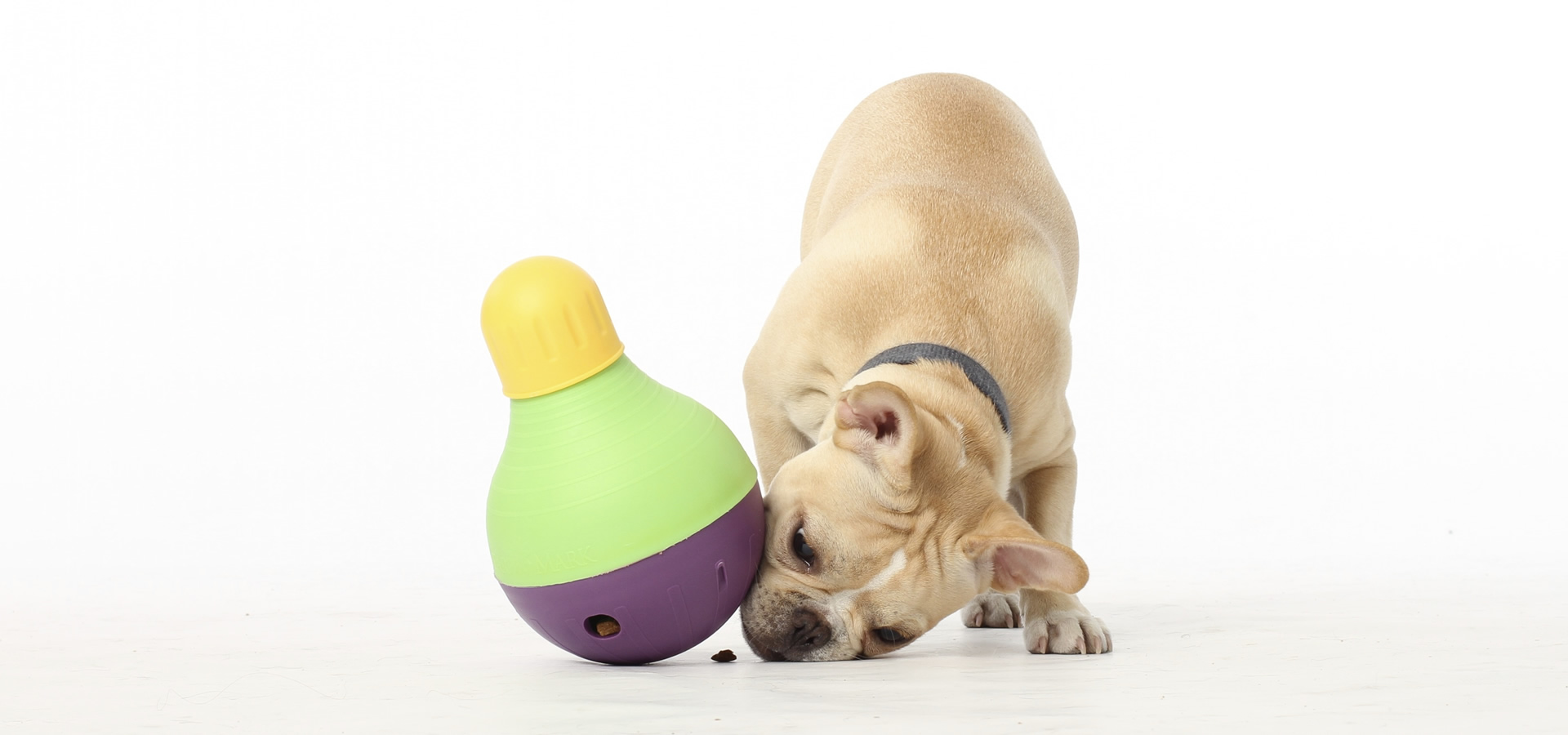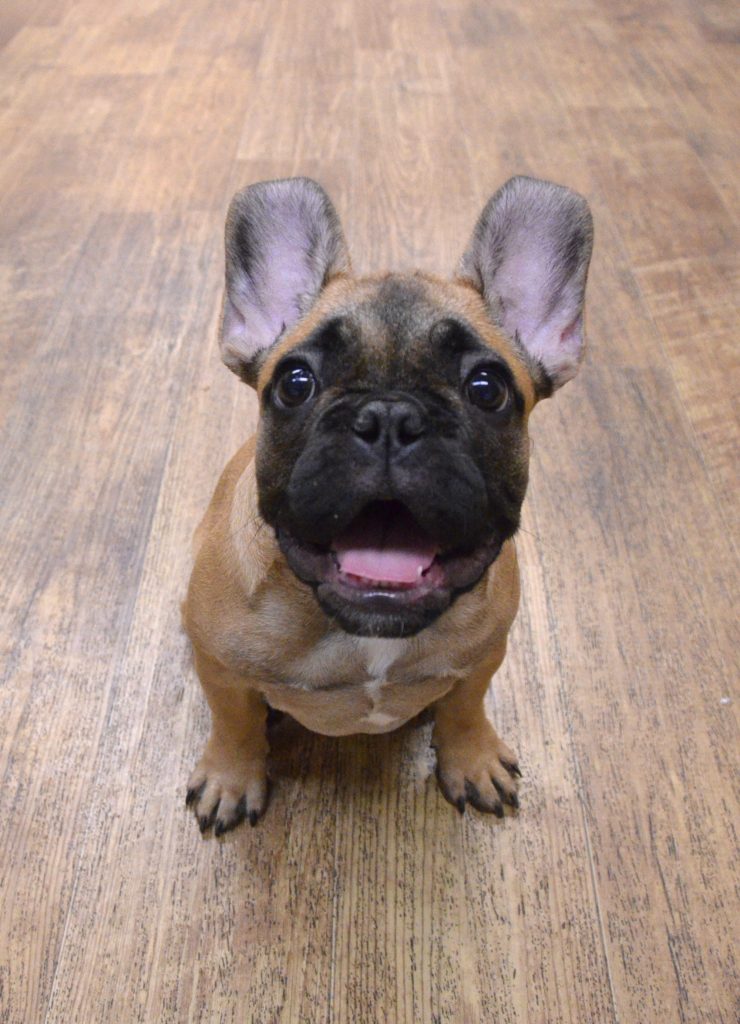
How to Train French Bulldog
Frenchie Fundamentals
French Bulldogs have super big personalities in a sturdy, little frame. They’re lively, playful, and determined when they set their minds to something. Frenchies are charming, entertaining, little dogs and are sometimes not given credit for their trainability.
Effectively employing positive reinforcement in training a French Bulldog means using what they want as leverage to motivate them. Helping your French Bulldog learn that you are the source of all the good stuff they want (food, toys, attention, etc.) and that responding to your requests is the way to earn those things is in their best interest. A cooperative canine gets to enjoy life that much more and is best assured to live a long and happy life with their family. Consider as an example that teaching your Frenchie to reliably come when called could be the skill that saves their life if they ever got loose.
Frenchie Speak
Frenchies will quickly learn what works and what doesn’t. They tend to have a wide range of vocalizations and vocalize often should they be reinforced for this when young. A Frencie pup’s yodels and squeals are adorable. But, consider that behaviors that are reinforced tend to increase in frequency. So, if living with an adult French Bulldog who yodels, squeals, and screams when they want something doesn’t sound appealing to you, then be very careful not to inadvertently reinforce these behaviors in your puppy.
Fitness for French Bulldog
French Bulldogs are brachycephalic dogs. That means they have skull bones that are shortened in length, resulting in a flatter or pushed in muzzle. As a result, they tend to suffer from respiratory issues, some symptoms of which are snoring, wheezing, panting, and exercise intolerance. It is extremely important to help lesson theses issues by keeping your Frenchie at an appropriate weight (carrying even a pound or two of extra weight can be detrimental to their health) and to discuss with their veterinarian what an appropriate exercise schedule should be.
Treat Your French Bulldog Wisely

It’s especially important with French Bulldogs to use food in training wisely. Food rewards should be very small. Your Frenchie doesn’t have a scale in their mouth, so they will be thrilled with a little treat as much as a larger one. Plus, breaking treats into very tiny pieces means you give your dog more opportunities to play the training game and earn rewards (albeit very small ones). This way food rewards are less likely to affect your Frenchie’s waistline. You might also consider using your dog’s normal meals as rewards during training games planned around meal times.
Safety First
Be sure to plan for play and training times in Frenchie appropriate environments (not too hot, please), always provide fresh water, and take breaks from more active sessions to avoid overheating and respiratory strain.
When to Start Training Your French Bulldog
It’s never too late to help your French Bulldog develop better manners. Of course, the more mature a dog is the more likely they are to have strongly established behavior patterns, some are those we love and others not so much due to lack of early education. So, it’s ideal to start training as soon as your puppy arrives home.

French Bulldog Training Goals
Raising a well mannered and social adult dog starts with your French Bulldog puppy’s early education. There are many things your puppy needs to learn. Your priorities will be:
- Time alone skills
- House training
- Socialization
- Basic Manners Skills (attention, come when called, sit, down, stand, stay, and impulse control)
Time Alone Skills for French Bulldog
One of the first things you want to prioritize is helping your Frenchie to learn to rest calmly and quietly when you can’t attend to them. Being that your puppy has had no previous experience practicing time alone skills (they were with their littermates and mom), be sure to introduce time alone practice sessions as soon as your pup arrives home and in a gradual manner. By starting immediately you’re using to your benefit the fact that your pup needs to sleep much of the day. You can use a crate and/or an exercise pen as a rest area for your pup.
- Start by having your pup rest in their crate or exercise pen with you right next to them as they eat their meals. Repeat each day.
- When your pup is tired after a play and/or training session, have them rest in their crate or exercise pen with you nearby.
- Have your pup rest in their crate or exercise pen with a food stuffed chew toy with you nearby.
- Gradually increase the time your pup is expected to hang out in their rest area with you nearby.
- Practice walking away for short bits of time and gradually increase the length of time you are out of sight from your puppy.
House Training Using the Crate Training vs Exercise Pen for Your French Bulldog Puppy
Both a crate and an exercise pen are beneficial management tools for your puppy for many reasons:
- A confinement area keeps your puppy safe when you can’t watch them. While resting in one of these two areas your puppy can’t ingest dangerous items found in your home.
- A confinement area keeps your home safe from your puppy. No matter how well you try to ‘puppy-proof’ your home, your Frenchie can cause serious damage if left unsupervised before learning what is and is not appropriate to chew and where to potty.
- Both a crate and an exercise pen help your puppy learn self pacifying skills which helps to reduce the risk of future separation anxiety issues.
- A crate is useful as a tool for helping your puppy build bladder and bowel muscle control. Starting with extremely brief rest periods in the crate and gradually increasing the time they nap in it means your pup is getting plenty of opportunities to learn to ‘hold it’ for age appropriate lengths of time. After resting in a crate you can immediately take your pup to their designated potty spot and reward them for going there. In this way, the crate is a terrific way of accurately predicting when your pup needs to potty.
- An exercise pen is useful if you need to leave your pup for longer than you think they can reasonably ‘hold it’ in the crate. The exercise pen should include a potty spot (potty pads or a low pan type potty area) and a comfortable rest area.
- When using either management tool, be sure to always give your Frenchie puppy a couple of food stuffed chew toys to keep them happily occupied ‘hunting’ for their food.
- When not resting in a crate or exercise pen, your Frenchie puppy should be supervised at all times. This way you can keep them safe and out of trouble, and guide them towards appropriate behaviors.
Make Time for Socialization French Bulldog
The French Bulldog is generally keen to make new friends. However, it’s not uncommon for adult Frenchies to be more discerning about the dogs they’re fond of. Further, due to their shape, stiff body, and the manner in which they breathe (snorting, huffing, and grunting), Frenchies may not be well received by other dogs. Further, Frenchies tend to have a bold, intense manner of play with dogs. So it’s important to plan for play times with age appropriate puppies so your Frenchie has lots of opportunities to learn appropriate play skills. Of great importance is learning to exhibit impulse control when meeting and interacting with other dogs. Overly enthusiastic and pushy play can be ill received by another dog.
Attendance at trainer moderated puppy play groups allows your pup the chance to learn how to ‘read the room’ and react accordingly. It’s also important not to allow your French Bulldog puppy to charge up to other dogs to say hello. As cute as this may seem for a puppy, the same manner of interaction for an adult dog may be met with a less than friendly response. Teach your puppy that they must be by your side and able to focus on you when they see other dogs as there is a time and a place for interactions and that is generally best left to off leash play with appropriate dogs in an appropriate setting.
Basic Foundation Manners and Obedience Training of French Bulldog
It’s advisable to have your dog on a light leash, even when in the home, when you start training. This way you can prevent them wandering off to distractions. It’s also best to have a handful of tiny, healthy treats as effective rewards for a job well done. Praise can be an effective reward, but most dogs are most enthused at the prospect of a tasty food reward. Consider what you expect as pay from your job and if you would be thrilled at the prospect of your wage being a pat on the back and someone telling you
“job well done!” Your employers aren’t offended that you prefer something other than just praise, and you shouldn’t be offended that your dog likewise would generally prefer a high value food reward. This is especially true when working with a younger dog who doesn’t yet have a years long established bond with you.
Keep it Fun with your French Bulldog
You know your goal is for your French Bulldog to learn good manners skills, but they don’t have to know that they are going to school. Using dog-friendly, positive training means your dog will simply think you are playing games with them and having mutual fun!
Keep it Brief
Dogs tend to learn best in several sessions throughout each day that are just 3-5 minutes long. An added benefit of many brief sessions each day is that it gets you in the habit of expecting good manners all day, rather than just when in ‘formal’ training sessions.
Sit, Stand, and Down with French Bulldog
- Sit: Hold a treat in your hand at your Frenchie’s mouth and lift your hand very slightly up and back towards their forehead. This will lure your dog into a sit. Say yes or good (either of these works well as a marker word) and give the tiny treat. Repeat a few times until your dog is moving into the sit promptly as you move your hand slightly up and back. At this point you can add the cue/command for “sit” right before you move your hand.
- Stand: When your dog is in a sit place your hand holding the treat at their mouth and then move your hand forward so they follow it into a stand. Say your marker word and give a tiny treat. Repeat until your dog is smoothly following your hand movement into the stand and then you can add the word “stand” right before you make the hand movement.
- Down: When your dog is in a sit place your hand that is holding a treat at their mouth and move it very slowly to the ground right between their feet and then slowly move it a little bit in and towards their belly. When your dog follows your hand to the ground an slides into a down (best to work on a non-carpeted floor to start) say your marker word and give a tiny treat. Add the word “down” right before moving your hand once they are reliably following your hand movement into the position.
Hand Targeting/Come When Called
Hold a treat in one hand and keep it well out of your dog’s reach. With your other hand, present a flat palm about 3-6” from your dog. Say your marker word the moment they touch your hand and then give a treat. Repeat a few times and then present your hand a bit farther away. Once your dog is reliably bopping your hand with their nose you can say “touch” or “here” right before you present your flat palm. Repeat many times each day and gradually increase the distance you are away from your dog so they get lots of opportunities to build a strong recall muscle!
Impulse Control
Teaching your French Bulldog to develop good self control is one of the most important life skills. The foundation of this is learning to sit when a treat is held over head, rather than jumping for it or otherwise being demanding (i.e. barking). Lure your dog into a sit and then hold a treat about 12” over their head. If they jump for it you should quickly pull your arm up and away and wait for them to offer a sit. Lower your hand to 12” away from them when they do. If your dog stays seated for even just a second or two, mark and reward. Repeat a few times and then try counting to three seconds prior to marking and rewarding for them staying seated. Any time your dog jumps up for the treat swing your arm up and away. This simple exercise is at the core of lots of more advanced impulse control exercises you will want to work on in the future
Grooming and Handling Your Frenchie
Compared to many dogs, French Bulldogs are very easy in regards to required grooming. However, their signature wrinkles require daily attention to prevent bacteria and yeast and they need attention paid to their nails and teeth.
- Plan for daily 3-5 minute handling and grooming each day with your puppy to get them comfortable. Take things slow and keep your pup happily occupied with a food stuffed toy.
- Use an unscented and pet safe wipe to clean in the folds of their skin, paying special attention to their face, feet, and underbelly.
- Keep your Frenchies nails trimmed to an appropriate length to prevent malformation of their feet due to overgrown nails. If you aren’t experienced with nail trimming, have your dog visit a groomer, but still plan for training sessions at home that include lots of brief and gentle manipulation of their feet.
- Do a weekly full body groom with a soft brush and hand towel to keep their coat in good condition, to remove dirt and to check for any lumps or parasites.
Developmental Stages of French Bulldogs
As is the case with many smaller dogs, French Bulldogs develop a bit more rapidly than a medium, large, or giant breed.
Puppyhood: From around 8 weeks to 12 weeks your Frenchie is in the prime of their puppyhood. This is an ideal time to focus on a foundation for manners and social skills.
Pre-Adolescence: By the time they are about 3-4 months of age, your Frenchie is starting to move into their pre-adolescent stage. They are gaining confidence, perhaps being a bit pushier in play, an exhibiting frustration when they don’t get what they want when they want it. It’s important to build on the foundation set in early puppyhood and to continue practicing training skills, social skills, an to employ management to prevent the practice of unwanted behaviors.
Adolescence: At around 5 months of age your Frenchie is an adolescent. This can be one of the more challenging stages of their development as they have hormonal surges, more energy than ever, and a tendency to seemingly forget all of the training during puppyhood. To avoid the inevitable frustrations of living with a teenager, be sure to be extra diligent about using all the things your teenage Frenchie wants (food, toys, attention, life rewards like being invited up on the couch, etc.) to your benefit by asking your dog to do a little something prior to earning what they want. Have them sit prior to putting their bowl down, ask them to hand target before tossing a favorite toy, or ask them to lie down before inviting them up for a snuggle.
Adulthood: By the time your Frenchie is an adult, at around a year old, you will have spent loads of time guiding them towards great behavior. You can now focus on daily maintenance of all of these skills. Be sure to help your Frenchie stay fit and happy by planning for weekly activities that give them a chance to exercise both physically and mentally, and to partake in their most favorite pastime…spending time with you.
Explore Our Dog Training Courses
Educate your dog with Andrea Arden and her team.
New York | Los Angeles | Connecticut
Share
- Group Classes
- Private Lessons
- Virtual Training
- Puppy Play Groups
- Puppy Training
- Articles & Advice

